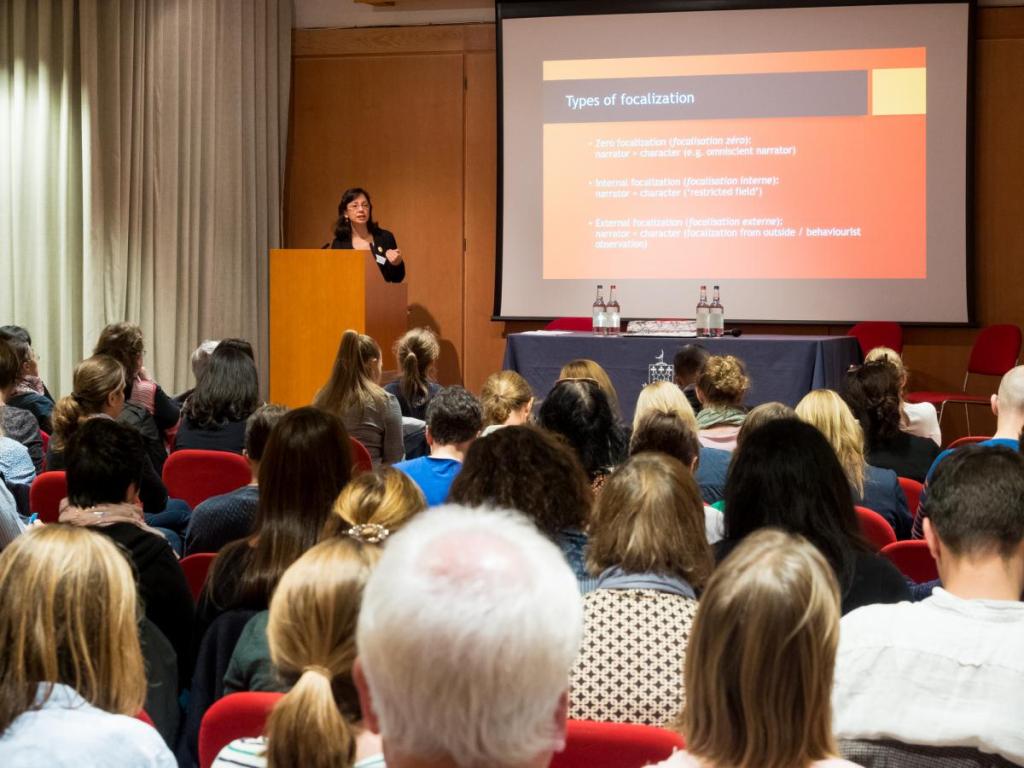
In September 2019, our annual conference for Modern Languages Teachers returned to Somerville College, where we had enjoyed the 2018 conference. It was a pleasure to be back in a college that combines all the best of Oxford: Somerville’s progressive history of championing women’s education, combined with its friendly staff and impressive facilities, was once again a fitting venue as we work towards widening access to Oxford and celebrating languages across the board. Ninety-five teachers attended the conference this year: fifty-one from the state sector, forty-two from the independent sector, and two retired members. Once again, the delegates flocked from all over the UK to join us, with teachers hailing from all four nations. In addition to the around twenty members of the Faculty who attended the conference, we were pleased to welcome Professor Suzanne Graham from the University of Reading, and Dr Nina Rolland from the University of Birmingham, as our efforts to collaborate Languages Outreach across the university sector continue.
Building on last year’s programme, this year we offered a similar mix of academic content related to the A Level syllabus, taster lectures, and admissions sessions. The conference began with a roundtable on ‘Languages in Performance’. Professor Wes Williams, Tutor in French at St Edmund Hall, gave an illuminating account of his ‘Storming Utopia’ project, which saw him collaborate with Pegasus Theatre to explore creatively and communally what it means to live as part of an archipelago in a post-Brexit context. Dr Alex Lloyd, German Tutor at St Edmund Hall, discussed her project on the ‘White Rose’, a WWII German Resistance group, explaining that students at Oxford have been translating some of the texts produced by the White Rose Group. Dr Noah Birksted-Breen, who is part of the Creative Multilingualism Research Programme, spoke about modern Russian theatre, drawing our attention to his fascinating work on the ‘Slanguages’ project, which has included adapting Ivan Vyrypaev’s play Oxygen into a hip-hop format. Finally, Dr Rolland from the Baudelaire Song Project at Birmingham University, discussed workshops the project has facilitated in schools to explore creative learning of French through music. The mix of speakers on the roundtable made for a fascinating exploration of the potential for using performing arts to enhance language learning.
Following the roundtable, Professor Catriona Seth gave a wonderful talk on ‘Marie Antoinette and Objects’. Professor Seth took us through some of the material aspects of Marie Antoinette’s life, and opened our eyes to some of the fascinating ways in which we can interrogate these objects to learn more about Marie Antoinette herself.
All this thinking worked up a thirst, and we proceeded to a drinks reception before moving on to dinner in Somerville’s welcoming dining hall. After dinner, our Director of Outreach, Professor Julie Curtis, offered thanks to our generous donors, the Willetts family who, although absent, were in our thoughts as their generosity allowed us to subsidise attendance for teachers in the state sector. Following this, we enjoyed a remarkable after-dinner address by our guest speaker, Sir Tim Hitchens. Sir Tim is President of Wolfson College and has had a long and distinguished career in diplomacy. We were lucky to hear him reflect on his own experiences of multilingualism and the richness of cultural difference, as well as his impassioned defence of modern foreign languages. So inspired were the delegates that many continued the conversation, equally passionately, in the college bar afterwards!
We rose early on the Saturday morning for a literary circus on ‘Points of View’. Academics from the sub-faculties of French, German, Spanish, and Italian spoke about different approaches to exploring perspective in a selection of texts from the A Level syllabi. Dr Giuseppe Stellardi and Dr Karolina Watroba explored this in the context of drama, considering Sei personaggi in cerca d’autore and Der Besuch der alten Dame respectively. Meanwhile Dr Jennifer Yee and Dr Olivia Vázquez-Medina explored points of view in the novel form, looking at No et Moi and La casa de los espíritus. Although we could not cover all of the texts on the A Level syllabus, we hope that these talks pointed towards some ways of approaching the issue of literary ‘Points of View’ that might be transferred across different texts.
After a break, we reconvened for the ‘Building Bridges’ session. First, Professor Graham presented her research on vocabulary acquisition at Key Stage three. Professor Graham has studied the effects of using factual or creative source material on language learning. Following this, Alex Hobson, from Darrick Wood School, continued the theme of motivating language learners by giving us am intriguing and colourful account of her school’s partnership with a sister school in China, including the exchanges pupils from each school went on. We continue to be awed by the amount of energy MFL teachers seem to bring so routinely to the subject, and the many imaginative ways in which languages are promoted in this difficult climate.
The programme concluded with a session on admissions. Professor Curtis, gave a mock interview with a current student of Italian and History at Oxford, and we finished with time for some questions. After lunch, most delegates departed but a handful stayed on for an optional extra workshop on ‘Creative Translation’. This additional workshop was delivered by Dr Charlotte Ryland, of the Queen’s College Translation Exchange, an initiative dedicated to celebrating languages and translation, in particular by reaching out to young people learning languages at school.
Overall, the 2019 Conference was a busy one but provided a fertile forum for discussion of language teaching, both in the context of the syllabus and beyond. It was a pleasure to meet everyone who attended and shared with us their love for teaching and learning languages. We hope to see many of you again at the 2020 conference.